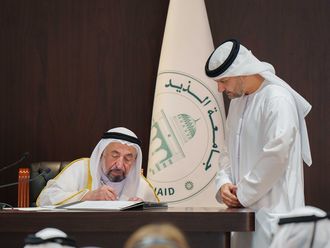Abu Dhabi: Nearly 80 per cent of parents in the emirate of Abu Dhabi appear to be satisfied with the safety standards and the code of conduct maintained at schools, a recently released survey has found.
This is despite a number of tragic incidents that occurred during 2014, including the death of a four-year-old who was mistakenly left locked in her private school’s bus, and the alleged rape of a seven-year-old at a public school.
The survey, which received responses from 53,780 parents of children at public and private schools, was conducted by the emirate’s education sector regulator, the Abu Dhabi Education Council (Adec).
There are currently 189 private schools and 256 public schools in Abu Dhabi emirate.
A total of 70 questions in the poll focused on parents’ opinions regarding teaching standards, the length of school days, children’s average scores in school subjects, effectiveness of communication with school staff, the level of exposure to elements of national heritage and schools’ morality and safety standards.
Parents who spoke to Gulf News reaffirmed their trust in the emirate’s schooling system.
“Both my sons are enrolled at a private school in the capital, and I am personally very appreciative of the security measures they undertake. For example, each child has to carry an ID card when getting on and off a bus, which helps prevent bus-related mishaps,” Khadra Abdullah, 40, a nurse from Somalia, told Gulf News.
“I chose the institution through word-of-mouth recommendations, which I believe are essential for deciding if a school meets your personal standards for your children’s education,” she added.
A.N., a 37-year-old father-of-three, agreed with the survey results on school safety.
“The tragic incidents of the past year, in my opinion, are standalone occurrences. They do not reflect the overall safety level at Abu Dhabi institutions. Of course, as a parent, I have worried more about my three children since I heard of the incidents, and have therefore tried to take precautionary measures,” he said.
Another important survey result indicates that families’ involvement with their children’s education decreases as children progress to higher grades.
“Despite the importance [of such engagement], families’ active involvement in children’s education declines as they progress from kindergarten to elementary school and to middle and high school,” said Dr Amar Al Qubaisi, director-general at the Adec.
“Research suggests, however, that a school can play a pivotal role in reversing this trend,” she added.
Parents’ responses also show that nearly 70 per cent of parents are happy with the teaching quality at the schools in which their children are enrolled. More than 80 per cent of parents with children at private schools are also satisfied with their children’s average scores in maths, English and science subjects. On the other hand, 84 per cent of parents with children in public schools are happy with the level of attainment in Arabic, compared to 80 per cent of parents with children attending private schools.
According to the report supplied by the Adec, the majority of children still use school-provided transport. However, a greater percentage of families with children in private schools use their own cars for transport purposes.
Parents’ overall responses are currently available for each individual school through the Adec website.












